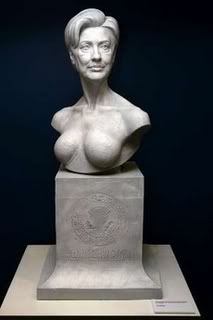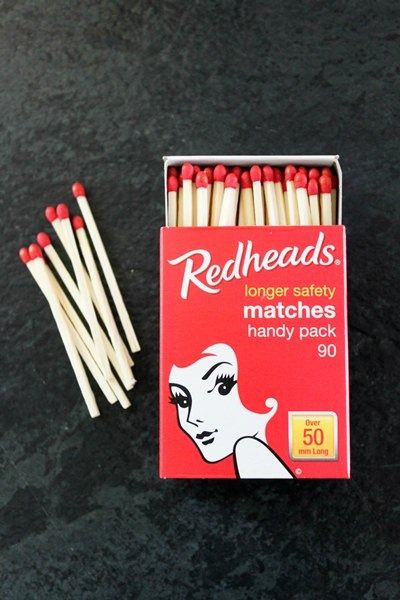It has been pointed out to me that I mistakenly identified Miss Bicondova's ancestry as Russian when it is obvious she is of Italian descent. I sincerely apologize.
However, I can still claim her as a cousin, albeit on the other side of the family.
Like Danny Glover, I'm getting too old for this stuff.
**** Update 4/1/2016:
I hear Mr. Glover has endorsed Generalissimo Sanders [maker of the world's worst fried chicken] and that saddens me. I don't know why. I assume everyone in Holyweird is a commie, so why am I disappointed in Danny Glover? I may have to think this one through for a while, kiddies.
Featured Post
It seems Pope Francis needs to brush up on his Tertullian!
It has been reported (in The ChristLast Media, I must note) that the current Pope does not like the phrase "lead us not into temptation...
"Let no freedom be allowed to novelty, because it is not fitting that any addition should be made to antiquity. Let not the clear faith and belief of our forefathers be fouled by any muddy admixture." -- Pope Sixtus III
Sunday, December 13, 2015
It seems I owe an apology to Miss Camren Bicondova and her family.
Posted by
TheChurchMilitant
at
8:20 AM
0
comments
![]()
Sunday, December 06, 2015
Please pray for Mother Angelica.
The beautiful, wonderful foundress of EWTN is not feeling well. Do Mother a solid this Advent season and take your whole family to confession. You won't regret it.
Posted by
TheChurchMilitant
at
8:36 AM
0
comments
![]()
Friday, December 04, 2015
The Whore of Babble-On, Loretta Lynch, is threatening to prosecute Americans who criticize mohammedism. Bring it on, you fascist cunt!
Until the mohammedans start killing the motherfucking goat rapists among them, their religion will be known as the religion of terrorism, murder, hate, death, and ignorance.
When the American caudillo arises and total war is unleashed upon all mohammedans, don't look to the Christians for help. We'll have long since been silenced by our moral and intellectual superiors, the social fascists.
Today, Friday December 4, 2015 is Day 3.
Posted by
TheChurchMilitant
at
1:21 PM
0
comments
![]()
Thursday, December 03, 2015
Oops. Never mind, just another "workplace violence" incident, which, according to the Moslem?What Moslem?Media happened only a mile from a PP abattoir.
Thursday December 3, 2015 is Day Two.
(If you, like our jug-eared dick-tater, think I'm the bad guy, you might be a dumbass.)
The conservatives' favorite serial adulterer just had his first funny line in decades: "Said Farouk is Arabic for 'climate change'".
Posted by
TheChurchMilitant
at
9:44 AM
0
comments
![]()
Wednesday, December 02, 2015
WELCOME TO OBAMASTAN, KIDDIES. ARE YOU GOING TO DIE LIKE SHEEP OR ARE YOU READY TO SHOOT BACK LIKE REAL AMERICANS?
WEDNESDAY DECEMBER 2, 2015 IS DAY ONE.
Posted by
TheChurchMilitant
at
9:29 PM
0
comments
![]()
Friday, September 18, 2015
The Confederate flag may be the evilist thing EVER, but at least it doesn't chop up black kids for fun and profit.
Yes, kiddies, the babyeaters from Planned Black Genocide [Everybody sing along: "Maggie Sanger hated blacks 'cause they wouldn't bang her. They weren't like her, so she turned to murder. and the WASPs were happy all day!"] can't stop talking about how much fun treating people like chattel is.
Chattel? Hell, those babies should be so lucky. They are treated like hamburger.
And what do the killers and their enablers [our moral and intellectual superiors] say in their defense?
"Those videos were faked!"
That's the moral equivalent of claiming blacks were better off in bondage and the Shoah never happened.
FULL FOOTAGE: Planned Parenthood Baby Parts Buyer StemExpress Wants "Another 50 Livers/Week
FULL FOOTAGE: Planned Parenthood Baby Parts Vendor Advanced Bioscience Resources
FULL FOOTAGE: PPCAPS Deb VanDerhei
FULL FOOTAGE: PPFA Dr. Carolyn Westhoff
FULL FOOTAGE: Planned Parenthood Keystone Vanessa Russo and PPCAPS Deb Vanderhei and Deb Vanderhei
FULL FOOTAGE: PPFA Dr. Vanessa Cullins
FULL FOOTAGE: PPCAPS Deb Vanderhei and Anne-Marie Grewer
Thank God for folks like the courageous souls from The Center for Medical Progress. Someday, when sanity is restored and all children are safe from the predatory PP perverts, they will be remembered as righteous among the nations.
Posted by
TheChurchMilitant
at
3:25 PM
2
comments
![]()
Labels: Big Babykilling, GET YOUR WOMBS OUT OF MY WALLET, In vitro no one can hear you scream, Orgasm Über Alles, SEX IS DEATH, Words don't kill People do
Tuesday, September 08, 2015
Friday, August 28, 2015
The flight of the innocents.
Posted by
TheChurchMilitant
at
3:55 PM
0
comments
![]()
Labels: The face of things to come
Tuesday, August 25, 2015
The face of things to come.
Posted by
TheChurchMilitant
at
8:27 AM
4
comments
![]()
Labels: Battleground: Pennsylvania, Big Babykilling, Big Masturbation, Catholic crackup, GET YOUR WOMBS OUT OF MY WALLET, GOVERNMENT IS THEFT, Guilty Pleasures, The face of things to come
Wednesday, August 19, 2015
Behold the baby-eating ghouls of Planned Black Genocide in all their unedited gory!
'What You Do is You Go Through the Face': Seventh Center for Medical Progress Video Released
FULL FOOTAGE: Planned Parenthood Uses Partial-Birth Abortions to Sell Baby Parts
FULL FOOTAGE: Planned Parenthood VP Says Fetuses May Come Out Intact, Agrees Payments...
FULL FOOTAGE: Second Planned Parenthood Senior Executive Haggles Over Baby Parts Prices
Posted by
TheChurchMilitant
at
3:36 PM
0
comments
![]()
Labels: Big Babykilling, Big Masturbation, GET YOUR WOMBS OUT OF MY WALLET, GOVERNMENT IS THEFT, In vitro no one can hear you scream, Orgasm Über Alles, Words don't kill People do
Yet another modest proposal: Arm the Mexican illegals.
Think about it, kiddies. Why do millions of Mexicans risk their lives to flee the land of their birth and invade us illegally? The answer is simple. Mexico is a shit hole.
Poverty, crime, drugs, a kleptocratic ruling class, you name it. Mexico is a Third World sewer so awful as to make Obamastan look like a paradise in comparison. The solution? Why, a little revolution, of course.
Let's offer all adult male Mexicans here illegally weapons and training in exchange for a pledge to overthrow their corrupt overlords and establish of a bourgeois democracy with free and frequent elections.
We'll offer them complimentary air cover, too. [This will also serve to deter them from trying to use our generous gifts to take back Texas, Arizona, New Mexico, et al.
Now that's a plan, Mr. Trump!
Posted by
TheChurchMilitant
at
2:59 PM
0
comments
![]()
Labels: GOVERNMENT IS THEFT, Guilty Pleasures, None dare call it treason
Friday, July 31, 2015
The face of things to come.
Posted by
TheChurchMilitant
at
4:40 PM
0
comments
![]()
Labels: GOVERNMENT IS THEFT, Guilty Pleasures, In vitro no one can hear you scream, None dare call it treason, The face of things to come, Words don't kill People do
Thursday, April 23, 2015
The AmericaLast Media finally begin to hunt the elusive Sacred Cow.

Just say no to the Sacred Cow, kiddies!
 How did a redneck left-fascist and his ignorant shrew of a wife become multi-millionaires by starting a charitable [only 15% of the funds they raise go to actual charitable causes, BTW] foundation? Here are three long-overdue stories about bribery, influence peddling, and treason that should give you a clue.
How did a redneck left-fascist and his ignorant shrew of a wife become multi-millionaires by starting a charitable [only 15% of the funds they raise go to actual charitable causes, BTW] foundation? Here are three long-overdue stories about bribery, influence peddling, and treason that should give you a clue.
From the Old Gray Whore:
Cash Flowed to Clinton Foundation as Russians Pressed for Control of Uranium Company
The foundation and its list of donors have been under intense scrutiny in recent weeks. Republican critics say the foundation makes Clinton, who is seeking the Democratic presidential nomination in 2016, vulnerable to undue influence. Her campaign team calls these claims "absurd conspiracy theories."
The charities' errors generally take the form of under-reporting or over-reporting, by millions of dollars, donations from foreign governments, or in other instances omitting to break out government donations entirely when reporting revenue, the charities confirmed to Reuters.
The errors, which have not been previously reported, appear on the form 990s that all non-profit organizations must file annually with the Internal Revenue Service to maintain their tax-exempt status. A charity must show copies of the forms to anyone who wants to see them to understand how the charity raises and spends money.
The unsettled numbers on the tax returns are not evidence of wrongdoing but tend to undermine the 990s role as a form of public accountability, experts in charity law and transparency advocates told Reuters.
"If those numbers keep changing - well, actually, we spent this on this, not that on that - it really defeats the purpose," said Bill Allison, a senior fellow at the Sunlight Foundation, a government transparency advocacy group.
For three years in a row beginning in 2010, the Clinton Foundation reported to the IRS that it received zero in funds from foreign and U.S. governments, a dramatic fall-off from the tens of millions of dollars in foreign government contributions reported in preceding years.
Those entries were errors, according to the foundation: several foreign governments continued to give tens of millions of dollars toward the foundation's work on climate change and economic development through this three-year period. Those governments were identified on the foundation's annually updated donor list, along with broad indications of how much each had cumulatively given since they began donating.
"We are prioritizing an external review to ensure the accuracy of the 990s from 2010, 2011 and 2012 and expect to refile when the review is completed," Craig Minassian, a foundation spokesman, said in an email.
The decision to review the returns was made last month following inquiries from Reuters, and the foundation has not ruled out extending the review to tax returns extending back 15 or so years.
Minassian declined to comment on why the foundation had not included the necessary break-down of government funding in its 990 forms. He said it was rare to find an organization as transparent as the foundation.
"No charity is required to disclose their donors," he said. "However, we voluntarily disclose our more than 300,000 donors and post our audited financial statements on our website along with the 990s for anyone to see."
Separately, the Clinton Health Access Initiative (CHAI), the foundation's flagship program, is refiling its form 990s for at least two years, 2012 and 2013, CHAI spokeswoman Maura Daley said, describing the incorrect government grant break-outs for those two years as typographical errors.
CHAI, which is best known for providing cheaper drugs for tens of thousands of people with HIV around the world, began filing separate tax returns in 2010, and has previously refiled at least once both its 2010 and 2011 form 990s. For both those years, CHAI said its initial filings had over-reported government grants by more than $100 million.
Some experts in charity law and taxes said it was not remarkable for a charity to refile an erroneous return once in a while, but for a large, global charity to refile three or four years in a row was highly unusual.
"I've never seen amendment activity like that," said Bruce Hopkins, a Kansas City lawyer who has specialized in charity law for more than four decades, referring to the CHAI filings.
Clinton stepped down from the foundation's board of directors this month but her husband, Bill Clinton, and their daughter, Chelsea Clinton, remain directors.
The foundation said last week after Hillary Clinton became a candidate that it would continue to accept funding from foreign governments, but only from six countries that are already supporting ongoing projects. CHAI will also continue to receive foreign government funding, again with additional restrictions.
Nick Merrill, Clinton's spokesman, has declined to answer inquiries about the foundation and CHAI.
The amount, about one-quarter of Clinton’s overall speaking income between 2001 and 2013, demonstrates how closely intertwined Bill and Hillary Clinton’s charitable work has become with their growing personal wealth.
The Clintons’ relationships with major funders present an unusual political challenge for Hillary Rodham Clinton. Now that she has formally entered the presidential race, the family may face political pressure and some legal requirements to provide further details of their personal finances and those of the foundation, giving voters a clearer view of the global network of patrons that have supported the Clintons and their work over the past 15 years.
Bill Clinton was paid more than $100 million for speeches between 2001 and 2013, according to federal financial disclosure forms filed by Hillary Clinton during her years as a senator and as secretary of state.
A spokesman for Bill Clinton declined to comment on the overlap between speech sponsors and foundation donors, saying only that the former president’s speaking schedule has been largely consistent since he left the White House.
Craig Minassian, a spokesman for the foundation, said it makes sense that supporters of the foundation would also be eager to hear from the former president.
“It’s not surprising that organizations who believe strongly in the Clinton Foundation’s mission and are impressed by its results are genuinely interested in President Clinton’s perspective,” Minassian said. “The president often says the foundation is his life today, and he welcomes any opportunity to educate people about it and encourage more people to work together to solve some of the most critical global challenges we all face.”
Many of those funders were major financial institutions that are viewed suspiciously by liberals whom Clinton has been courting as she seeks to secure the Democratic nomination — and avoid a vigorous primary challenge from the populist left.
Four major financial firms — Goldman Sachs, Barclays Capital, Deutsche Bank and Citigroup — collectively have given between $2.75 million and $11.5 million to the charity, which is now called the Bill, Hillary and Chelsea Clinton Foundation. Between 2001 and 2013, their combined speech payments to Bill Clinton came to more than $3 million.
The Post analysis also revealed aspects of Bill Clinton’s paid speaking career during Hillary Clinton’s tenure at the State Department that were not clear from her public filings.
Those included:
●The role played by dozens of companies and organizations, some of them associated with foreign governments or with interests before the U.S. government, in serving as secondary hosts for a number of the speeches. In her filings, Hillary Clinton typically disclosed only the primary sponsor of each speech.
One such “sub-sponsor” was Boeing, a major government contractor whose interests Hillary Clinton promoted in her official duties at the State Department.
●Four speeches delivered by Bill Clinton did not appear in Hillary Clinton’s filings. One such speech was a 2012 address to an annual meeting of the Carlyle Group, a politically connected private-equity firm.
A spokesman for Bill Clinton’s office said the former president at times spoke to benefit the foundation, which would not trigger a disclosure requirement for Hillary Clinton. None of the four speech sponsors are listed as foundation donors. The spokesman said the proceeds were classified as non-tax-deductible revenue — not donations.
The Clintons’ finances have already become a political flash point with the much-anticipated release next month of a new book examining the foundation and the family’s personal wealth. The Clinton campaign has dismissed “Clinton Cash,” written by conservative author Peter Schweizer, as a partisan attack.
The Post received a copy of the manuscript after signing a non-disclosure agreement with publisher HarperCollins. This article is based on reporting and documents collected independently from Schweizer’s book.
The foundation itself has also emerged as an issue. In recent weeks, some Democrats have expressed anxiety about the foundation’s receipt of millions of dollars in donations from foreign governments while Hillary Clinton was secretary of state. Records show that the foundation accepted contributions from seven foreign governments during that time, including one donation that the foundation has acknowledged violated an ethics agreement with the Obama administration designed to limit new foreign-government donors.
It is not unusual for former presidents to boost their income through an active schedule of paid lectures; records show Bill Clinton has often shared the stage with former president George W. Bush or delivered speeches in front of groups that had previously hosted Bush or his father, former president George H.W. Bush.
Clinton has been in particular demand as a speaker because of his renowned oratory and growing popularity in post-presidential life, partly based on the widely respected work of the foundation. Speech organizers, which have included universities, charities and major lecture series, report that the former president is a major draw and that he often boosts attendance for annual events.
What sets the Clintons apart is the vast reach of their donor network and the extent to which they have tapped it for the broad range of their personal, political and charitable work.
The Post’s analysis, based on foundation disclosures, State Department documents, financial filings and other records, shows that the lines between Clinton’s paid speeches and his work for the foundation often blurred as he traveled the world promoting the charity and reaping millions in payments.
Technology companies Microsoft and Cisco Systems, for instance, donated at least $1 million each to the foundation. The two companies paid Bill Clinton a total of $1.02 million in speaking fees for a series of lectures.
In September 2012, the Italian fitness equipment company Technogym paid Bill Clinton $500,000 for a speech in the northern Italian city of Cesena at a conference devoted to “creating a better and more sustainable world through people’s health,” according to financial disclosures and documents Bill Clinton’s office submitted to the State Department.
Technogym, which has also given between $25,000 and $50,000 to the foundation, reported in a news release that the speech came about in part because of the foundation’s work fighting childhood obesity.
Clinton spent much of his remarks discussing the work of the foundation to improve global health and comparing it to efforts by the company and its affiliated charity to promote the same ideas. “So I’m very interested in all these things that the Wellness Foundation and that this conference and that Technogym does — because we are trying to do this,” Clinton said, according to a YouTube video of his remarks.
Technogym did not respond to a request for comment.
The intermingling of foundation and paid work was also apparent earlier that year when Bill Clinton addressed an advertising festival in Cannes, France.
Grupo ABC, a major Brazilian advertising company, paid Bill Clinton $450,000 for the June 2012 appearance. Foundation records show that the firm has given the charity between $1.5 million and $6 million.
Excerpts from the event posted on YouTube show that Clinton was introduced with a video devoted to the work of the charity. “I personally believe that if the American people give you the honor of serving them, you should keep doing it after you leave office,” Clinton says in the video.
State Department records show that Bill Clinton gave a speech and participated in a moderated question-and-answer session in Cannes for 1,000 advertising employees and then attended a reception for 75 at a luxury hotel.
Grupo ABC spokesman Sergio Malbergier said the company has worked with a series of global charities and nongovernmental organizations as part of a belief in being a “socially responsible organization.” He said the company has supported the Clinton Foundation “because of the importance and effectiveness of its work.”
Bill Clinton was invited as a keynote speaker to help celebrate the company’s 10th anniversary, Malbergier said, because company leaders have found his vision “a great source of inspiration.”
A Clinton Foundation official said organizations that pay for the former president to speak are often interested in the work of the charity and request that Clinton address it in his remarks.
The Post analysis also found other previously unreported aspects of Bill Clinton’s speaking career.
While Hillary Clinton named the sponsoring organization for each of her husband’s speaking engagements, separate documents show that Bill Clinton’s office listed 97 additional sub-sponsors that had been proposed to help with these speaking events.
Bill Clinton disclosed the additional information as part of a voluntary ethics process undertaken when Hillary Clinton became secretary of state. He agreed to seek State Department approval of his paid speaking engagements to avoid conflicts of interest for his wife.
The correspondence between Bill Clinton’s office and the State Department was released in July after the conservative group Judicial Watch sought the records, ultimately filing suit to force their release.
Hillary Clinton was not obligated to disclose the sub-sponsors in her annual filings. The State Department’s correspondence with Bill Clinton’s office provides the only indication of the additional interests that helped support the former president’s paid speaking career.
In 2010, for instance, Hillary Clinton disclosed that her husband had been paid $250,000 to address the American Chamber of Commerce in Egypt.
But Bill Clinton’s office alerted the State Department that other sponsors for the event were proposed to include Etisalat, a large Middle Eastern telecommunications company whose majority owner is the government of the United Arab Emirates.
Likewise, in 2012, Hillary Clinton’s disclosures show, Bill Clinton was paid $250,000 for a Boston speech to the Global Business Travel Association.
But the documents filed by Bill Clinton’s office show that a proposed sub-sponsor was the aircraft manufacturing giant Boeing. During a 2009 trip to Russia, Hillary Clinton made a personal pitch for a state-owned airline to buy Boeing jets.
Gordon Johndroe, a Boeing spokesman, said the company has sponsored the major travel event for several years, regardless of its invited speakers.
In addition, the Post analysis found that Bill Clinton delivered some paid speeches during Hillary Clinton’s tenure at the State Department that were not publicly disclosed.
By law, Cabinet members and lawmakers must disclose speeches for which their spouses were paid at least $200. And the foundation has voluntarily updated its donor list on its Web site each year since 2008.
But four speeches were not disclosed in either fashion.
A spokesman for Bill Clinton’s office said that the former president “complied with disclosure requirements in every case” and that any speech fee not disclosed as personal income by Hillary Clinton went to the foundation.
But he said those fees were not tax deductible for the sponsoring organization and thus were not considered donations to the charity. He said they were included in the revenue figure provided in the foundation’s tax filings.
The examples The Post found were:
●A speech delivered in October 2011 in front of 9,000 at the University of Rochester’s Meliora Weekend, the school’s annual reunion and parents weekend. University officials confirmed that he delivered the speech for a fee, which they would not disclose.
●An appearance at the Minneapolis Heart Institute’s annual gala, also in October 2011. Event organizers said Clinton was supposed to attend in person but appeared via video link after a snowstorm confined him to Washington. They said a $25,000 fee was paid for his appearance at the event that, according to State Department records, was also sponsored by the Land O’Lakes dairy company.
“We wanted a speaker who could speak personally about heart disease and heart treatment,” said Minneapolis Heart Institute spokeswoman Melissa Hanson. “In addition, we wanted someone with first-class credibility. President Clinton was a natural fit.”
●A September 2012 question-and-answer session at the annual investors meeting of the politically connected private-equity company the Carlyle Group. A spokesman would not comment on Bill Clinton’s fee. According to Politico, Hillary Clinton was paid to appear at the same event a year later, after she stepped down as secretary of state.
●Bill Clinton’s participation as the guest of honor at a dinner in Limerick, Ireland, in November 2012 at which scholarships were awarded to Irish students. A spokeswoman for the organizing group confirmed Clinton traveled to Ireland to take part in the dinner.

Posted by
TheChurchMilitant
at
3:29 PM
0
comments
![]()
Labels: "What difference at this point does it make?”, GOVERNMENT IS THEFT, It Takes A Village To Staff A Gestapo Unit, None dare call it treason
Friday, February 13, 2015
ATTACK OF THE REDHEADED STUNNERS!
In order to help us all get through the latest bout of global warming/nuclear winter/climate change/alien abduction/yeti infestation/global flattening, here are some smoking hot redheads, yet another reason why it is stupid for mohammedans to try to kill us or enslave us.
From the pages of The King Abdullah Gazette:



Mmmmm...redhead with a gun...
































And now, the greatest redhead of all time, Ann-Margaret!




Three ginger wallpapers for your perusal...



Posted by
TheChurchMilitant
at
11:54 AM
0
comments
![]()
Labels: The King Abdullah Gazette
About Me
- TheChurchMilitant
- First of all, the word is SEX, not GENDER. If you are ever tempted to use the word GENDER, don't. The word is SEX! SEX! SEX! SEX! For example: "My sex is male." is correct. "My gender is male." means nothing. Look it up. What kind of sick neo-Puritan nonsense is this? Idiot left-fascists, get your blood-soaked paws off the English language. Hence I am choosing "male" under protest.
Labels
- "What difference at this point does it make?” (20)
- #HimToo (2)
- 24 (24)
- A little Latin lingo (16)
- AIDS (4)
- Animal Flesh Recipes (42)
- Are you a fake conservative? (146)
- ATTACK FROM THE RIGHT! (281)
- Battleground: Pennsylvania (25)
- Big Babykilling (152)
- Big Masturbation (53)
- Bolshevik The Clown (139)
- Book of the Day (122)
- Catholic Apologetics (25)
- Catholic crackup (74)
- Charlie Gard got the death penalty you know (10)
- Clump lies and freedom dies (111)
- Clump Rising (31)
- Clump über alles (53)
- Clump über alles. (47)
- Clumpy The Clown (70)
- Conservative Crackup (188)
- Dumbass Cinema (34)
- FUCK TRUMP IN THE RUMP (130)
- Germaine Greer In Drag (15)
- GET YOUR WOMBS OUT OF MY WALLET (58)
- GOVERNMENT IS HELL ON EARTH (77)
- GOVERNMENT IS MURDER (78)
- GOVERNMENT IS THEFT (172)
- Guilty Pleasures (80)
- Guns Don't Kill Abortionists Do (23)
- Heap Big Lying Squaw (5)
- Heat Nazis (71)
- In an insane society a sane man must appear to be insane (19)
- In vitro no one can hear you scream (54)
- It Takes A Village To Staff A Gestapo Unit (112)
- Jennifer Love Hewitt Love (11)
- LENIN OR GANDHI? (1)
- Lyin'-ass Bitch in the White House (138)
- Mayor McTerror (2)
- Mittens The Pompadoured Pussy (16)
- NeverClump (39)
- None Dare Call It Fascism (263)
- None Dare Call It Sin (70)
- None dare call it treason (274)
- Obama-rama (161)
- Orgasm Über Alles (114)
- Penis bad Vagina good (82)
- PLUTO HELD HOSTAGE (101)
- Power Is Love (65)
- Racist. (93)
- Real Mensches Of Genius (39)
- Reel Cinema (12)
- Religion of Peace and Love and Et Cetera (196)
- SEX IS DEATH (126)
- Shakespearean insults (15)
- She With The Unmentionable Straightened Hair (6)
- Sodomy: The New Black (54)
- Stop me if you've heard this one. (20)
- The face of things to come (4)
- The First Hair Straightener (22)
- The King Abdullah Gazette (306)
- The Long Hot Zombie Summer (36)
- The Theology of the Body (178)
- Third World problems (11)
- Totalitarian Pennsylvania (71)
- VOTE FOR ROMNEY NOT THE COMMIE (71)
- What Would Giffords Do? (35)
- Words don't kill People do (127)
- Zardoz (8)
FYODOR"S LINKS
- Major K. - He's home now, but his blog from Iraq remains.
- The Mudville Gazette
- BLACKFIVE
- Iraq The Model
- Catholic Encyclopedia
- 365 and a Wakeup - He's home now, but his blog from Iraq remains.
- Iowahawk
- theOneRepublic
- Captain's Quarters
- Michael Yon - old blog here
- A Star From Mosul
- Peeve Farm-Breeding peeves for show, not just to keep as pets.
- BlameBush! Because Bush is to Blame for Everything.
- CRISIS Magazine
- Disaffiliates-Think Twice
- Where have you gone, Ronald Reagan?
- (Get your own "Wars Prevented by the UN" counter here.)
- WI Catholic Musings
- Network of College Conservatives
- The Musings of David Amulet
- joannejacobs.com
- Stop The ACLU
- Crossed The Tiber
- R2K
- I link what I like. Show me what you've got.
Blog Archive
-
►
2018
(12)
- ► 03/04 - 03/11 (1)
- ► 01/14 - 01/21 (5)
- ► 01/07 - 01/14 (6)
-
►
2017
(500)
- ► 12/17 - 12/24 (1)
- ► 12/10 - 12/17 (5)
- ► 12/03 - 12/10 (2)
- ► 11/26 - 12/03 (4)
- ► 11/12 - 11/19 (5)
- ► 11/05 - 11/12 (1)
- ► 10/29 - 11/05 (19)
- ► 10/22 - 10/29 (4)
- ► 10/15 - 10/22 (6)
- ► 10/08 - 10/15 (2)
- ► 10/01 - 10/08 (6)
- ► 09/24 - 10/01 (3)
- ► 09/10 - 09/17 (7)
- ► 09/03 - 09/10 (6)
- ► 08/27 - 09/03 (12)
- ► 08/20 - 08/27 (17)
- ► 08/13 - 08/20 (10)
- ► 08/06 - 08/13 (7)
- ► 07/30 - 08/06 (11)
- ► 07/23 - 07/30 (14)
- ► 07/16 - 07/23 (13)
- ► 07/09 - 07/16 (26)
- ► 07/02 - 07/09 (15)
- ► 06/25 - 07/02 (14)
- ► 06/18 - 06/25 (9)
- ► 06/11 - 06/18 (14)
- ► 06/04 - 06/11 (15)
- ► 05/28 - 06/04 (12)
- ► 05/21 - 05/28 (16)
- ► 05/14 - 05/21 (20)
- ► 05/07 - 05/14 (19)
- ► 04/30 - 05/07 (18)
- ► 04/23 - 04/30 (17)
- ► 04/16 - 04/23 (9)
- ► 04/09 - 04/16 (5)
- ► 04/02 - 04/09 (17)
- ► 03/26 - 04/02 (23)
- ► 03/19 - 03/26 (14)
- ► 03/12 - 03/19 (13)
- ► 03/05 - 03/12 (13)
- ► 02/26 - 03/05 (17)
- ► 02/19 - 02/26 (11)
- ► 02/12 - 02/19 (13)
- ► 02/05 - 02/12 (9)
- ► 01/29 - 02/05 (4)
- ► 01/22 - 01/29 (1)
- ► 01/15 - 01/22 (1)
-
►
2016
(99)
- ► 12/25 - 01/01 (2)
- ► 12/18 - 12/25 (1)
- ► 12/11 - 12/18 (4)
- ► 12/04 - 12/11 (1)
- ► 11/27 - 12/04 (2)
- ► 11/20 - 11/27 (2)
- ► 11/13 - 11/20 (3)
- ► 11/06 - 11/13 (2)
- ► 10/23 - 10/30 (2)
- ► 10/16 - 10/23 (2)
- ► 10/09 - 10/16 (3)
- ► 09/18 - 09/25 (3)
- ► 08/07 - 08/14 (3)
- ► 07/31 - 08/07 (4)
- ► 07/24 - 07/31 (4)
- ► 07/17 - 07/24 (4)
- ► 07/10 - 07/17 (5)
- ► 07/03 - 07/10 (5)
- ► 06/19 - 06/26 (6)
- ► 06/12 - 06/19 (5)
- ► 06/05 - 06/12 (1)
- ► 05/29 - 06/05 (4)
- ► 05/22 - 05/29 (1)
- ► 05/15 - 05/22 (4)
- ► 05/08 - 05/15 (2)
- ► 05/01 - 05/08 (3)
- ► 04/24 - 05/01 (2)
- ► 04/17 - 04/24 (1)
- ► 04/10 - 04/17 (2)
- ► 03/27 - 04/03 (3)
- ► 03/13 - 03/20 (2)
- ► 03/06 - 03/13 (1)
- ► 02/21 - 02/28 (2)
- ► 01/24 - 01/31 (4)
- ► 01/17 - 01/24 (4)
-
▼
2015
(18)
- ► 11/29 - 12/06 (3)
- ► 08/16 - 08/23 (2)
- ► 02/01 - 02/08 (3)
-
►
2014
(54)
- ► 11/02 - 11/09 (8)
- ► 09/21 - 09/28 (4)
- ► 09/14 - 09/21 (5)
- ► 08/03 - 08/10 (2)
- ► 07/27 - 08/03 (4)
- ► 07/20 - 07/27 (1)
- ► 06/29 - 07/06 (1)
- ► 06/22 - 06/29 (6)
- ► 06/15 - 06/22 (1)
- ► 06/08 - 06/15 (1)
- ► 06/01 - 06/08 (7)
- ► 05/18 - 05/25 (3)
- ► 05/11 - 05/18 (10)
- ► 05/04 - 05/11 (1)
-
►
2013
(11)
- ► 12/01 - 12/08 (1)
- ► 11/24 - 12/01 (1)
- ► 11/17 - 11/24 (8)
- ► 02/24 - 03/03 (1)
-
►
2012
(665)
- ► 12/09 - 12/16 (5)
- ► 12/02 - 12/09 (6)
- ► 11/25 - 12/02 (1)
- ► 11/11 - 11/18 (2)
- ► 11/04 - 11/11 (1)
- ► 10/28 - 11/04 (16)
- ► 10/21 - 10/28 (15)
- ► 10/14 - 10/21 (23)
- ► 10/07 - 10/14 (8)
- ► 09/30 - 10/07 (19)
- ► 09/23 - 09/30 (13)
- ► 09/16 - 09/23 (40)
- ► 09/09 - 09/16 (7)
- ► 09/02 - 09/09 (17)
- ► 08/26 - 09/02 (18)
- ► 08/19 - 08/26 (23)
- ► 08/12 - 08/19 (37)
- ► 08/05 - 08/12 (13)
- ► 07/29 - 08/05 (15)
- ► 07/22 - 07/29 (25)
- ► 07/15 - 07/22 (24)
- ► 07/08 - 07/15 (18)
- ► 07/01 - 07/08 (18)
- ► 06/24 - 07/01 (25)
- ► 06/17 - 06/24 (4)
- ► 06/10 - 06/17 (27)
- ► 06/03 - 06/10 (12)
- ► 05/27 - 06/03 (30)
- ► 05/20 - 05/27 (24)
- ► 05/13 - 05/20 (12)
- ► 05/06 - 05/13 (14)
- ► 04/29 - 05/06 (2)
- ► 04/22 - 04/29 (5)
- ► 04/15 - 04/22 (6)
- ► 04/08 - 04/15 (7)
- ► 04/01 - 04/08 (2)
- ► 03/25 - 04/01 (16)
- ► 03/18 - 03/25 (6)
- ► 03/11 - 03/18 (12)
- ► 03/04 - 03/11 (15)
- ► 02/26 - 03/04 (11)
- ► 02/19 - 02/26 (12)
- ► 02/12 - 02/19 (19)
- ► 02/05 - 02/12 (11)
- ► 01/29 - 02/05 (2)
- ► 01/22 - 01/29 (8)
- ► 01/15 - 01/22 (5)
- ► 01/08 - 01/15 (2)
- ► 01/01 - 01/08 (12)
-
►
2011
(692)
- ► 12/25 - 01/01 (3)
- ► 12/18 - 12/25 (8)
- ► 12/04 - 12/11 (9)
- ► 11/27 - 12/04 (8)
- ► 11/06 - 11/13 (8)
- ► 10/30 - 11/06 (11)
- ► 10/23 - 10/30 (7)
- ► 10/16 - 10/23 (14)
- ► 10/09 - 10/16 (13)
- ► 10/02 - 10/09 (4)
- ► 09/25 - 10/02 (15)
- ► 09/18 - 09/25 (5)
- ► 09/11 - 09/18 (20)
- ► 09/04 - 09/11 (11)
- ► 08/28 - 09/04 (27)
- ► 08/21 - 08/28 (25)
- ► 08/14 - 08/21 (18)
- ► 08/07 - 08/14 (29)
- ► 07/31 - 08/07 (37)
- ► 07/24 - 07/31 (21)
- ► 07/17 - 07/24 (30)
- ► 07/10 - 07/17 (28)
- ► 07/03 - 07/10 (12)
- ► 06/26 - 07/03 (14)
- ► 06/19 - 06/26 (9)
- ► 06/12 - 06/19 (5)
- ► 06/05 - 06/12 (14)
- ► 05/29 - 06/05 (7)
- ► 05/22 - 05/29 (8)
- ► 05/15 - 05/22 (31)
- ► 05/08 - 05/15 (19)
- ► 05/01 - 05/08 (12)
- ► 04/24 - 05/01 (9)
- ► 04/17 - 04/24 (15)
- ► 04/10 - 04/17 (15)
- ► 04/03 - 04/10 (10)
- ► 03/27 - 04/03 (18)
- ► 03/20 - 03/27 (13)
- ► 03/13 - 03/20 (16)
- ► 03/06 - 03/13 (21)
- ► 02/27 - 03/06 (27)
- ► 02/20 - 02/27 (14)
- ► 02/13 - 02/20 (2)
- ► 02/06 - 02/13 (8)
- ► 01/30 - 02/06 (8)
- ► 01/23 - 01/30 (11)
- ► 01/16 - 01/23 (11)
- ► 01/09 - 01/16 (6)
- ► 01/02 - 01/09 (6)
-
►
2010
(42)
- ► 12/26 - 01/02 (2)
- ► 12/19 - 12/26 (1)
- ► 11/21 - 11/28 (1)
- ► 11/14 - 11/21 (3)
- ► 11/07 - 11/14 (1)
- ► 09/05 - 09/12 (1)
- ► 08/29 - 09/05 (15)
- ► 08/22 - 08/29 (4)
- ► 08/15 - 08/22 (4)
- ► 08/08 - 08/15 (5)
- ► 07/25 - 08/01 (1)
- ► 05/16 - 05/23 (3)
- ► 03/07 - 03/14 (1)
-
►
2007
(849)
- ► 11/11 - 11/18 (10)
- ► 11/04 - 11/11 (61)
- ► 10/28 - 11/04 (38)
- ► 10/21 - 10/28 (66)
- ► 10/14 - 10/21 (59)
- ► 10/07 - 10/14 (48)
- ► 09/30 - 10/07 (76)
- ► 09/23 - 09/30 (40)
- ► 02/11 - 02/18 (27)
- ► 02/04 - 02/11 (74)
- ► 01/28 - 02/04 (85)
- ► 01/21 - 01/28 (104)
- ► 01/14 - 01/21 (96)
- ► 01/07 - 01/14 (65)
-
►
2006
(3989)
- ► 12/31 - 01/07 (63)
- ► 12/24 - 12/31 (57)
- ► 12/17 - 12/24 (77)
- ► 12/10 - 12/17 (88)
- ► 12/03 - 12/10 (79)
- ► 11/26 - 12/03 (73)
- ► 11/19 - 11/26 (35)
- ► 11/12 - 11/19 (71)
- ► 11/05 - 11/12 (112)
- ► 10/29 - 11/05 (86)
- ► 10/22 - 10/29 (60)
- ► 10/15 - 10/22 (102)
- ► 10/08 - 10/15 (72)
- ► 10/01 - 10/08 (76)
- ► 09/24 - 10/01 (71)
- ► 09/17 - 09/24 (86)
- ► 09/10 - 09/17 (81)
- ► 09/03 - 09/10 (62)
- ► 08/27 - 09/03 (84)
- ► 08/20 - 08/27 (75)
- ► 08/13 - 08/20 (90)
- ► 08/06 - 08/13 (69)
- ► 07/30 - 08/06 (95)
- ► 07/23 - 07/30 (89)
- ► 07/16 - 07/23 (23)
- ► 07/09 - 07/16 (78)
- ► 07/02 - 07/09 (57)
- ► 06/25 - 07/02 (111)
- ► 06/18 - 06/25 (103)
- ► 06/11 - 06/18 (85)
- ► 06/04 - 06/11 (73)
- ► 05/28 - 06/04 (68)
- ► 05/21 - 05/28 (90)
- ► 05/14 - 05/21 (73)
- ► 05/07 - 05/14 (84)
- ► 04/30 - 05/07 (74)
- ► 04/23 - 04/30 (65)
- ► 04/16 - 04/23 (77)
- ► 04/09 - 04/16 (65)
- ► 04/02 - 04/09 (84)
- ► 03/26 - 04/02 (86)
- ► 03/19 - 03/26 (87)
- ► 03/12 - 03/19 (65)
- ► 03/05 - 03/12 (69)
- ► 02/26 - 03/05 (53)
- ► 02/19 - 02/26 (75)
- ► 02/12 - 02/19 (52)
- ► 02/05 - 02/12 (90)
- ► 01/29 - 02/05 (97)
- ► 01/22 - 01/29 (89)
- ► 01/15 - 01/22 (66)
- ► 01/08 - 01/15 (51)
- ► 01/01 - 01/08 (46)
-
►
2005
(2291)
- ► 12/25 - 01/01 (41)
- ► 12/18 - 12/25 (49)
- ► 12/11 - 12/18 (64)
- ► 12/04 - 12/11 (72)
- ► 11/27 - 12/04 (56)
- ► 11/20 - 11/27 (55)
- ► 11/13 - 11/20 (25)
- ► 11/06 - 11/13 (75)
- ► 10/30 - 11/06 (86)
- ► 10/23 - 10/30 (68)
- ► 10/16 - 10/23 (69)
- ► 10/09 - 10/16 (61)
- ► 10/02 - 10/09 (62)
- ► 09/25 - 10/02 (65)
- ► 09/18 - 09/25 (79)
- ► 09/11 - 09/18 (82)
- ► 09/04 - 09/11 (64)
- ► 08/28 - 09/04 (81)
- ► 08/21 - 08/28 (86)
- ► 08/14 - 08/21 (64)
- ► 08/07 - 08/14 (85)
- ► 07/31 - 08/07 (61)
- ► 07/24 - 07/31 (60)
- ► 07/17 - 07/24 (58)
- ► 07/10 - 07/17 (75)
- ► 07/03 - 07/10 (82)
- ► 06/26 - 07/03 (79)
- ► 06/19 - 06/26 (94)
- ► 06/12 - 06/19 (104)
- ► 06/05 - 06/12 (75)
- ► 05/22 - 05/29 (49)
- ► 05/15 - 05/22 (52)
- ► 05/08 - 05/15 (38)
- ► 05/01 - 05/08 (65)
- ► 04/24 - 05/01 (8)
- ► 04/17 - 04/24 (2)



You're welcome, by the way. You are now famous.
Also, is an "s hit" one of those new baseball metrics?
Imagine the ones I think are too inappropiate to print, kiddies.